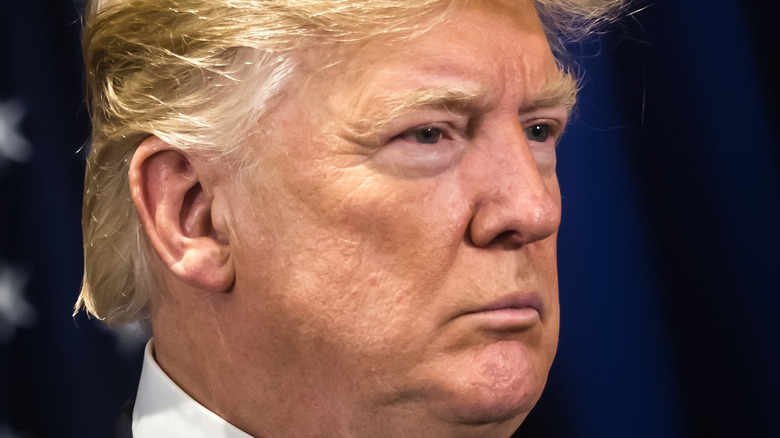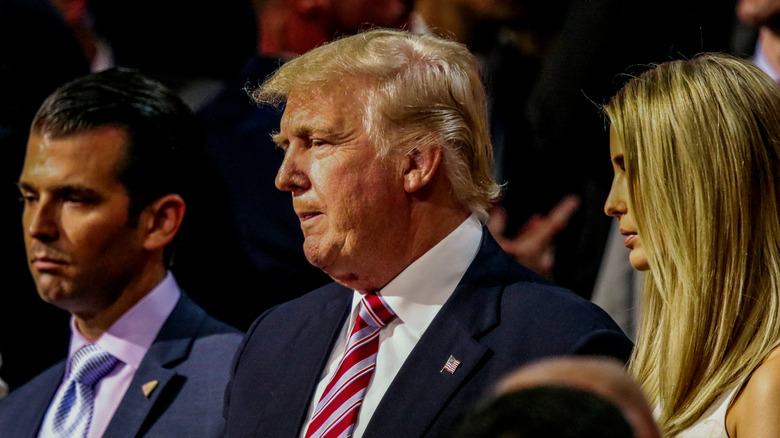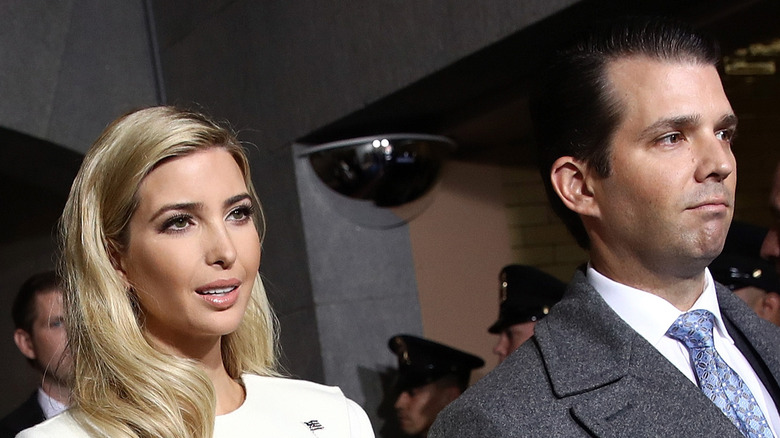The New Ruling About Donald Trump And His Children Explained
The day that Donald Trump has been hoping to avoid has arrived. In December, the New York State Attorney General's office issued subpoenas to get depositions from Trump, Ivanka Trump, and Donald Trump, Jr. in regards to a civil fraud investigation into the Trump Organization (via The Washington Post). Trump's response was to sue New York State Attorney General Letitia James in an attempt to stop the investigation (per The New York Times). However, instead of having the investigation stopped, in a recent ruling, New York Supreme Court Justice Arthur Engoron confirmed that the investigation will continue and that Trump and his eldest children must give depositions (per CNN).
The argument from the Trump team is that the investigation is personally motivated, and they're also concerned that testimony and documents requested in the civil case could have an impact on the criminal investigation that is being run by Manhattan District Attorney (per The New York Times). Both cases are connected to determining if the Trump Organization presented fraudulent financial information to lenders; however, with the New York State civil case, fines and a lawsuit would be the punishment as compared to criminal charges possible with the Manhattan DA case (via The New York Times).
Judge Engoron dismissed the idea that James should stop the investigation, and now Trump and his children are required to provide requested documents within 14 days and provide depositions within 21 days.
The judge said the Trumps can plead the fifth if needed
In the final decision, Judge Arthur Engoron wrote, "In the final analysis, a State Attorney General commences investigating a business entity, uncovers copious evidence of possible financial fraud, and wants to question, under oath, several of the entities' principals, including its namesake. She has the clear right to do so."
Engoron made the point that even when the three testify, they are within their rights to refuse to answer questions, and he referenced the fact that Eric Trump, who testified in the investigation in October, pleaded the fifth over 500 times (via CNN).
The argument from Trump's attorney Ronald Fischetti in response to taking the fifth amendment option was "that'll be on every front page in the newspaper in the world" (per KRON4). And if there was ever a criminal grand jury investigation, Fischetti said it would make it impossible to get a jury in the case of a potential criminal grand jury investigation.
During the two hour hearing on whether they'd need to provide depositions, Trump's lawyers got so worked up that the judge called for "time-outs" by putting their hands in a T, like you'd see at a sporting event, to allow for a moment to calm down (per The New York Times).
Potentially fraudulent financial documents are at the heart of the case
New York State Attorney General Letitia James has found "specific evidence that suggests Donald J. Trump and the Trump Organization falsely and fraudulently valued multiple assets and misrepresented those values to financial institutions" that would have given them more favorable loans and loan rates (via NBC News). James' goal of speaking to Trump and his children, according to The New York Times, is to try and determine exactly who was responsible for any misrepresentations on the financial documents.
In recent days, accounting firm Mazars USA sent a letter to the Trump Organization's general counsel that said the "Statements of Financial Condition" they had prepared for Trump and his companies from June 30, 2011 to June 30, 2020 "should no longer be relied upon." This lends credibility to James' argument that something fishy was going on with the Trump financial documents.
Trump responded to the ruling with a long statement that ended by saying the situation "is a continuation of the greatest Witch Hunt in history—and remember, I can't get a fair hearing in New York because of the hatred of me by Judges and the judiciary. It is not possible!"
For her part, James commented on the ruling on Twitter, writing in part, "No one is above the law."


